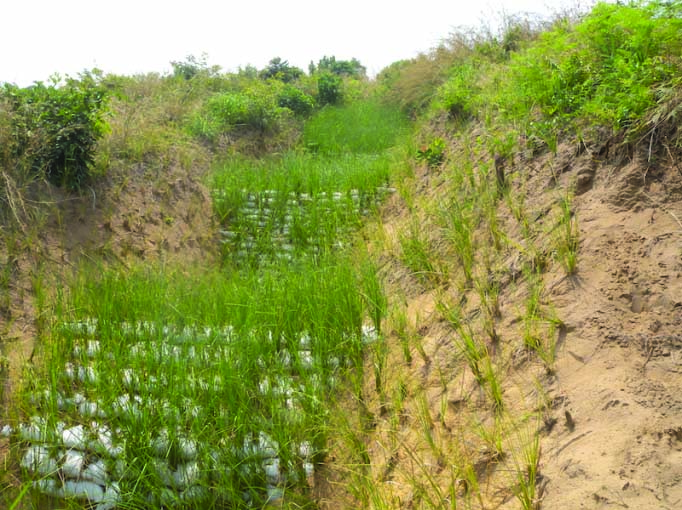

Reducir la erosión de los barrancos era importante para reducir la sedimentación de manantiales y arroyos en zonas bajas y la destrucción de infraestructuras. Para tratar y detener la formación de barrancos, el proyecto aplicó una técnica de bioingeniería con vetiver, una hierba conocida por sus raíces profundas que pueden controlar eficazmente la erosión del suelo. En este método, se compactan bolsas llenas de tierra en los barrancos para detener su progresión. Se planta vetiver en la parte superior de las bolsas rellenas de tierra fértil. Normalmente, las bolsas se deterioran y se rompen bajo el sol, pero las raíces del vetiver mantienen la tierra en su sitio.
También se estabilizaron las orillas de los ríos con hierba vetiver tras eliminar los salientes irregulares y suavizar la pendiente. Se crearon viveros de vetiver para abastecer las dos zonas de trabajo (cerca de la depuradora y cerca de Kinshasa).
Una organización benéfica local cercana a Kinshasa, donde el terreno disponible para proyectos comunitarios es limitado, proporcionó espacio para un vivero de vetiver.
El uso del vetiver para el control de la erosión de los barrancos y del suelo también tuvo mucho éxito, porque los residentes locales percibieron inmediatamente el valor de protección que proporcionaba el vetiver, sobre todo cuando los terrenos estaban situados cerca de sus casas, escuelas o carreteras públicas. Antes del proyecto, las comunidades de la cuenca no conocían la eficacia de la hierba vetiver como medida de control de la erosión. Ahora, las comunidades vecinas han mostrado gran interés en reproducir la metodología de bioingeniería.